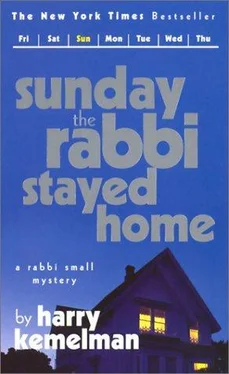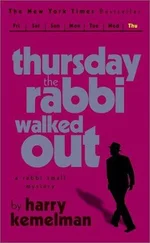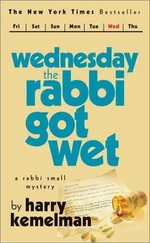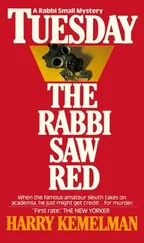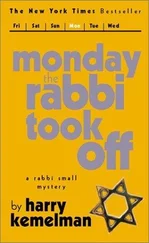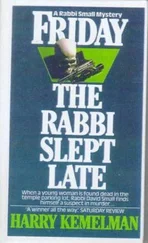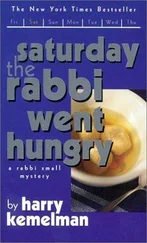Harry Kemelman - Sunday the Rabbi Stayed Home
Здесь есть возможность читать онлайн «Harry Kemelman - Sunday the Rabbi Stayed Home» весь текст электронной книги совершенно бесплатно (целиком полную версию без сокращений). В некоторых случаях можно слушать аудио, скачать через торрент в формате fb2 и присутствует краткое содержание. Город: New York, Год выпуска: 2002, ISBN: 2002, Издательство: iBooks, Жанр: Иронический детектив, на английском языке. Описание произведения, (предисловие) а так же отзывы посетителей доступны на портале библиотеки ЛибКат.
- Название:Sunday the Rabbi Stayed Home
- Автор:
- Издательство:iBooks
- Жанр:
- Год:2002
- Город:New York
- ISBN:978-0743452380
- Рейтинг книги:3 / 5. Голосов: 1
-
Избранное:Добавить в избранное
- Отзывы:
-
Ваша оценка:
- 60
- 1
- 2
- 3
- 4
- 5
Sunday the Rabbi Stayed Home: краткое содержание, описание и аннотация
Предлагаем к чтению аннотацию, описание, краткое содержание или предисловие (зависит от того, что написал сам автор книги «Sunday the Rabbi Stayed Home»). Если вы не нашли необходимую информацию о книге — напишите в комментариях, мы постараемся отыскать её.
Sunday the Rabbi Stayed Home — читать онлайн бесплатно полную книгу (весь текст) целиком
Ниже представлен текст книги, разбитый по страницам. Система сохранения места последней прочитанной страницы, позволяет с удобством читать онлайн бесплатно книгу «Sunday the Rabbi Stayed Home», без необходимости каждый раз заново искать на чём Вы остановились. Поставьте закладку, и сможете в любой момент перейти на страницу, на которой закончили чтение.
Интервал:
Закладка:
“This is the Barnard’s Crossing Police Department. Lieutenant Jennings. Will you please wait for our
Sergeant Hanks. He’ll be right over.”
“Police Department? What’s this all about?”
“Sergeant Hanks will explain.” said the voice at the other end, followed by a click as Lieutenant Jennings hung up.
Chapter Thirty-Three
Damn funny, all your folks should be out for the evening,” said Chief Lanigan. “What time are they expected back?”
Stu shrugged.
Didi said, “All I know is I found a note on the kitchen table saying they were going to a movie. They didn’t say which one, but I know it wasn’t the Seaside in Barnard’s Crossing because they already saw that one. And then they might go on someplace for coffee.”
“Well. I’ll just have the sergeant keep calling every fifteen minutes or so until we get them. You kids wait right here and don’t try anything funny.”
And he left them sitting in his office, the two boys on a bench by the wall. Didi in an armchair near the window. She looked forlorn and puffy-eyed. The shock of hearing of the death of a boy she had seen only a few hours before, followed by her arrest, had unnerved her completely. She had control of her emotions now, however, and stared moodily out the window at the little grass plot in front of the station house.
Stu edged closer to Bill Jacobs and whispered. “You know. I don’t think they’re going to let us go without our folks coming down. Maybe I ought to tell them that they’re at my Aunt Edith’s, and that he can reach them there.”
“You already told them you didn’t know.” Bill whispered back.
“No, I didn’t. He asked us if we knew what time they are coming back, but he didn’t ask us where they were.”
“I think we should sit tight. Maybe when he calls and finds our folks are out, he’ll let us go.”
Stu sat back unhappy, his fingers drumming nervously on the arm of the bench. He edged forward again. “You know what. Bill? I think we ought to tell them about Moose—I mean, about how we found him.”
“Sure, why not? You’re in the clear.” said Bill bitterly. “It doesn’t matter to you.”
“What does that mean?”
“Well, you weren’t in the house at all during the storm.
And he was dead already when you showed up. But where does that leave me and Didi?”
“But they’re going to find out sooner or later.”
“How are they going to find out? From what I overheard the cops talking, they think he just died from an overdose of alcohol.”
“Yeah, but that’s just the cops. Once a doctor examines the body, he’ll know he didn’t die that way. He’ll be able to tell whether a guy died of alcohol or from suffocation.”
“I don’t mean we shouldn’t tell them,” Bill temporized, “but I don’t think we have to tell them anything without a lawyer. And they can’t count it against us,” he said with an assurance he did not feel. “That’s the law.”
“Maybe you’re right. I wish my old man were here,” said Stu unhappily. “He’d raise hell with me for getting involved, but he’d know what to do. He’d see that the cops treated us fair. Say, who do you think could have done it?”
Bill shook his head. “I left the door unlatched. Anybody could have come in.”
“Hey, how about this Alan Jenkins? You all said Moose was leaning on him from the minute he laid eyes on him. These days they don’t take that lying down.”
“And he left Didi’s house in plenty of time to swing back there.”
“I know.”
Chapter Thirty-Four
What did you expect him to say, David? Mr. Wasserman is an old man; he’s practical. I know how you feel, but sometimes you have to compromise. You yourself have said that parnossah is necessary for a good life, that you can’t have a good life unless you’re making a living.” She had fussed over him like a mother hen, bringing him his slippers and pouring him a cup of hot tea liberally laced with whisky and lemon. “Drink it; it will ward off a cold.”
“Making a living is a necessity,” he said through her ministrations. “Making a good living is a luxury. I don’t need luxury for a good life. I don’t reject it, of course; I am not ascetic. But I don’t need it.”
“But wherever you go, except in small towns like Barnard’s Crossing, there will be more than one temple. And that will mean competition.”
He shook his head wearily. “You don’t understand, Miriam. In the nature of things the rabbi is paid by a temple or synagogue because here in America it’s the most practical way of compensating him for his work. But he is not the employee of the temple, just as a judge is compensated by the state but is still completely free to rule against it in an action. And if his courthouse bums down, it doesn’t mean that he loses all function and responsibility and purpose. But here, if the temple should split, we would have an ugly situation. The rabbis of the two institutions would become bargaining points in the two campaigns for membership. And I want no part of it.”
“But if as you say, you insist on being the rabbi for the entire community, it means living in a small town.”
“Well. I like small towns. Don’t you?”
“Ye-es, but small towns mean small communities, and small communities mean small pay. Don’t you have any personal ambition?”
He looked at her in surprise. “Of course. Why else would I spend so much time at my studies? But my ambition is to be a rabbi, not something else. I have no interest in using the rabbinate as a springboard to some other kind of work that pays more and carries greater prestige. I don’t think I’d care to be a big rabbi with a big pulpit at some prestigious temple where I could never be found because I’d have speaking engagements all the time. I wouldn’t like it, and”—he reached over and patted her, hand reassuringly—“you wouldn’t like it either. Maybe you’d be proud of me for a little while, seeing my name or my picture in the Jewish press. But after a while you’d get used to that, like everything else. Besides. I don’t think I could do it, anyway.”
“But you have to do some compromising. David, or—”
“Or what?”
“Or keep moving.”
“We’ve been here almost six years. But you’re right, we can’t keep moving. It’s not good for Jonathan, for one thing. And I’ve been thinking about it. Wherever I go, there will be other Gorfinkles and other Paffs.”
“So what do you plan to do?” she asked quietly.
He shrugged. “Oh, one day this week I’ll go down to New York and see Hanslick and tell him that I would like another position. I might look into the possibility of Hillel work—”
“David, is that why you are being so”—she was going to say stubborn, but decided on another word—“so resolute about this situation here?”
He gave her a sharp look and then smiled. “Catholics have their confessors,” he said, “and Jews have their wives. I think I like our arrangement better.”
“You’re dodging me,” she said but laughed in spite of herself.
“Am I? Yes, I suppose I am. Well, I think perhaps that is part of the reason. Didn’t you like it—the two days in Binkerton? To tell the truth, dear, I’m tired of fighting. I’ve been doing it for almost six years, ever since I came here. I was prepared for a certain amount of it, but I thought that once it was established just who was the rabbi here, I’d be able to concentrate on my real job. But throughout my tenure, I’ve had to fight just to stay. I tell you I’m tired of it.”
“You had an argument at Binkerton,” she observed.
“That was different. That was a matter of principle. I don’t know, maybe this is the wrong congregation for me. They’re so—so contentious.” He thrust his hands deep into his trouser pockets and strode the floor.
Читать дальшеИнтервал:
Закладка:
Похожие книги на «Sunday the Rabbi Stayed Home»
Представляем Вашему вниманию похожие книги на «Sunday the Rabbi Stayed Home» списком для выбора. Мы отобрали схожую по названию и смыслу литературу в надежде предоставить читателям больше вариантов отыскать новые, интересные, ещё непрочитанные произведения.
Обсуждение, отзывы о книге «Sunday the Rabbi Stayed Home» и просто собственные мнения читателей. Оставьте ваши комментарии, напишите, что Вы думаете о произведении, его смысле или главных героях. Укажите что конкретно понравилось, а что нет, и почему Вы так считаете.
